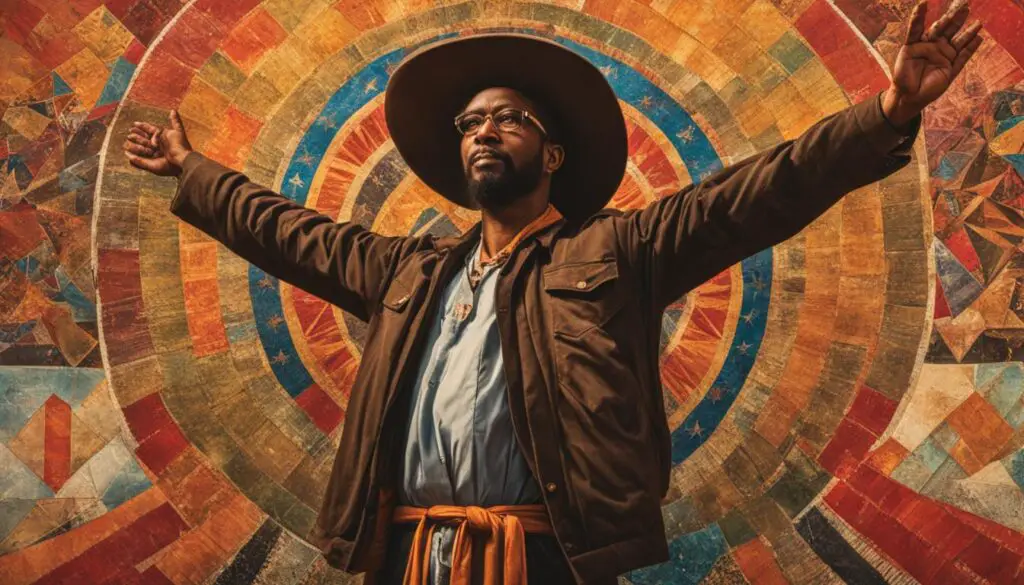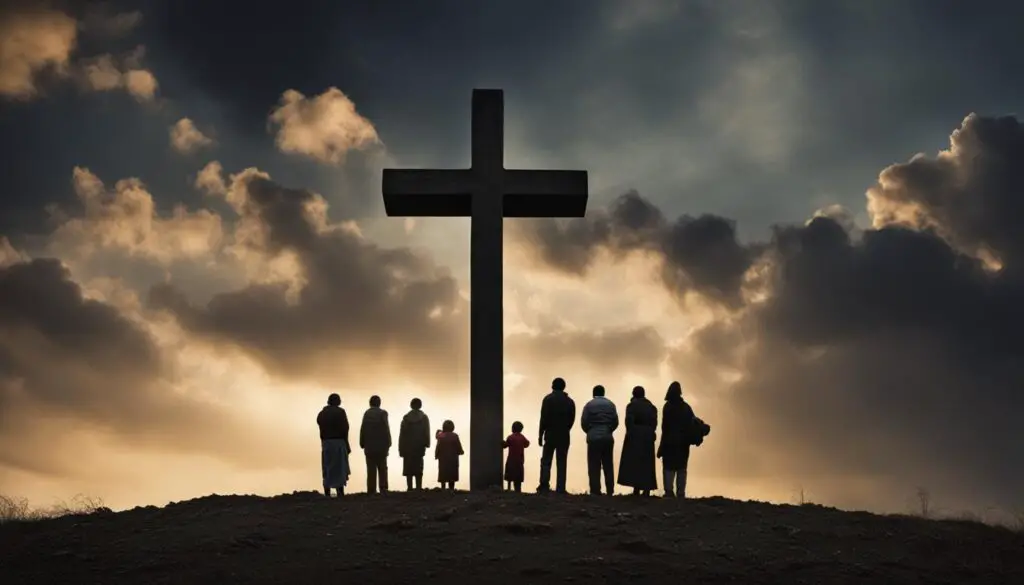Welcome to our latest article delving into the life and work of Jon Sobrino, a remarkable theologian and advocate for social justice. Sobrino’s journey is deeply rooted in his commitment to liberation theology and his unwavering dedication to the rights of the poor and marginalized. Through his experiences and teachings, he has inspired countless individuals to work towards a more just and equitable society.
Key Takeaways:
- Jon Sobrino is a Jesuit Catholic priest and theologian renowned for his contributions to liberation theology.
- His work is inspired by his commitment to peace and social justice, shaped by his firsthand experiences during the Salvadoran civil war.
- Sobrino’s key achievements include his influential writings, such as “Jesus the Liberator” and “Christ the Liberator.”
- He overcame challenges by remaining steadfast in his pursuit of social justice, even in the face of critique and controversy.
- Sobrino’s impact on society is evident in his lasting legacy in the field of theology and the continued inspiration he provides to advocates for the marginalized.
The Life and Work of Jon Sobrino
Jon Sobrino, a prominent figure in liberation theology, was born in Barcelona in 1938. He dedicated his life to advocating for the rights of the poor and oppressed in Latin America, particularly in El Salvador. After joining the Jesuits and arriving in El Salvador in 1957, Sobrino’s understanding of poverty and injustice deepened in 1974.
Sobrino’s works, including “Jesus the Liberator” and “Christ the Liberator,” became influential in the field of theology, inspiring countless individuals to pursue social justice. Through his writings and teachings, Sobrino emphasized the importance of liberation theology and its focus on the real-life experiences of marginalized communities.

Throughout his life, Sobrino faced numerous challenges in his pursuit of social justice. He witnessed the brutal assassination of his fellow Jesuits during the Salvadoran civil war, an event that further fueled his commitment to the liberation of the oppressed.
Despite controversies and criticism, Sobrino’s unwavering dedication to the marginalized has left a lasting legacy in the field of theology. His work continues to inspire theologians and activists to challenge systemic injustices and work towards a more just and equitable society.
The Influence of Ignacio Ellacuría
One of the key influencers in Jon Sobrino’s work and understanding of liberation theology was Ignacio Ellacuría, an esteemed Jesuit theologian. Together, they formed a powerful collaboration that left a lasting impact on the pursuit of social justice and liberation for the oppressed.
Ignacio Ellacuría was a committed proponent of liberation theology and a fervent advocate for the rights of the marginalized. His dedication to addressing societal inequalities and his unwavering commitment to the ideals of liberation theology greatly influenced Sobrino’s theological development.
In their shared journey at the University of Central America, Sobrino and Ellacuría nurtured a deep relationship that laid the foundation for their theological collaboration. Their shared experiences and beliefs led them to shape liberation theology theory, focusing on the experiences and struggles of the poor and oppressed.
Ignacio Ellacuría’s profound impact on Jon Sobrino and the field of liberation theology cannot be overstated. Together, they challenged the status quo and sought to dismantle systems of oppression through their theological insights. However, the path they chose was not without risks and sacrifices.
Their advocacy for social justice during the Salvadoran civil war led to tragedy. Ellacuría, along with six other Jesuits, was brutally assassinated for his unwavering commitment to the marginalized. Despite the immense loss, their legacy lives on, inspiring countless individuals in their pursuit of social justice and liberation.
What Jon Sobrino learned from Ellacuría was invaluable. The collaboration with Ellacuría reinforced Sobrino’s conviction that liberation theology must address the specific realities faced by the most vulnerable members of society. Their work together stands as a powerful testament to the transformative potential of a theology rooted in solidarity, justice, and liberation.
“We must always be on the side of the poor – the poorest people, the most helpless ones – who are suffering much more than we ever will.”
Together, Jon Sobrino and Ignacio Ellacuría exemplify the power of collaboration, the importance of standing up for the marginalized, and the transformative potential of theology rooted in justice. Their legacy continues to shape the discourse on liberation theology and remains a guiding light for those working to create a more equitable society.
Liberation Theology and the Crucified People
One of the key concepts in Jon Sobrino’s theology is the idea of the crucified people, which he explored in his book “Mysterium Liberationis.” This concept emerged from his reflection on the suffering and oppression of the poor in Latin America, particularly in El Salvador.
Sobrino believed that liberation theology should not be detached from the real-life experiences of the marginalized. Instead, it should actively engage with their struggles and advocate for their liberation. He saw the crucified people as a symbol of the unjust conditions endured by the most vulnerable members of society.
In his book, Sobrino discussed how the crucified people exemplify the plight of those who suffer under oppressive systems, such as poverty, violence, and social inequality. He argued that understanding and addressing their suffering is crucial for achieving true liberation and justice.

Sobrino’s emphasis on the crucified people challenged traditional notions of theology by actively involving theology in the pursuit of social justice. He called for a praxis-oriented theology, where theory and action merge to transform society and uplift the marginalized.
By focusing on the real-life experiences of the crucified people, Sobrino sought to inspire individuals to recognize their own role in advocating for justice and working towards societal transformation. He believed that true liberation could only be achieved when the needs and aspirations of the marginalized were at the forefront of theological discourse.
Through his teachings and writings, Sobrino’s advocacy for the crucified people continues to inspire theologians, activists, and individuals alike to confront social injustices and strive for a more equitable world.
Controversies and Criticisms
Jon Sobrino’s theology, particularly his emphasis on the human nature of Jesus Christ, has faced criticism from some within the Catholic Church. They argue that his focus on liberation theology diminishes the importance of Christ’s divine nature. Yet, Sobrino’s work challenges traditional beliefs and highlights the relevance of Jesus’ humanity in addressing the suffering and injustices of the world.
In 2007, Sobrino faced a theological critique and admonishment by the Congregation for the Doctrine of the Faith. This action was seen by many as an attempt to halt the spread of liberation theology, which seeks to address the systemic issues of poverty, inequality, and oppression.
However, Sobrino’s critics fail to recognize the transformative power of his theology and the impact it has had on countless individuals in their pursuit of social justice. By placing emphasis on the real-life experiences of the marginalized, Sobrino’s theology inspires action and calls for the liberation of all who suffer.
“Theology should not simply be an intellectual exercise but a force that empowers believers to confront and transform the unjust structures of society.”
– Jon Sobrino
While controversies may arise, it is essential to recognize the courage and conviction behind Sobrino’s work. His tireless advocacy for the marginalized serves as a reminder that challenging the status quo is necessary to bring about meaningful change.
Jon Sobrino’s example teaches us that standing up for the rights of the poor and oppressed requires unwavering determination, even in the face of criticism. We must not shy away from confronting the injustices of the world but instead strive to create a society that reflects the values of compassion, justice, and equality.
We should learn from Sobrino’s example, remaining steadfast in our commitment to pursuing social justice, even when faced with opposition. By embracing and advocating for the rights of the marginalized, we can contribute to a more equitable and compassionate world.
Jon Sobrino’s Legacy
Jon Sobrino’s work as a theologian and advocate for social justice has left an indelible mark on the field of liberation theology, particularly in Latin America. Throughout his career, he has inspired countless individuals to stand up for the rights of the poor and oppressed.
Sobrino’s legacy is rooted in his unwavering commitment to the marginalized. He believed that theology should not be an abstract intellectual exercise, but a transformative force that addresses the real-life experiences of those who suffer.
Inspired by his Christian faith and the teachings of Jesus, Sobrino dedicated his life to advocating for the liberation of the poor and oppressed. He was deeply influenced by the crucified people, those who bear the brunt of poverty, injustice, and violence.
“The crucified people are always there in our midst, suffering silently…It is not possible for us to speak of resurrection unless we speak of those who have been crucified”
Sobrino’s writings, including his seminal works “Jesus the Liberator” and “Christ the Liberator,” continue to guide theologians and activists in their pursuit of social justice. His words have resonated with people across the globe, empowering them to challenge systems of oppression and advocate for a more equitable society.
Despite facing criticism and controversy, Sobrino remained steadfast in his convictions. He endured personal attacks and even a theological critique by the Congregation for the Doctrine of the Faith, yet he persevered in his commitment to the marginalized.
Sobrino’s legacy extends beyond his theological contributions. His life and work serve as a powerful example of the transformative power of compassion, justice, and solidarity. He reminds us of the importance of standing with the least among us and speaking out against the systems that perpetuate inequality and suffering.

Jon Sobrino’s legacy continues to inspire individuals, theologians, and activists to this day. He has fostered a renewed commitment to social justice and a deeper understanding of the intersections between faith, liberation, and human rights.
As we reflect on Sobrino’s legacy, we are reminded of the transformative potential each of us possesses. We can learn from his example by actively advocating for justice, standing in solidarity with the marginalized, and working towards a world where all are treated with dignity and respect.
Overcoming Challenges and Pursuing Social Justice
Throughout his life, Jon Sobrino faced numerous challenges, demonstrating his unwavering commitment to pursuing social justice and advocating for the rights of the marginalized. One of the most significant challenges he encountered was the assassination of his fellow Jesuits during the Salvadoran civil war. This tragic event could have discouraged him or led him to abandon his mission, but instead, it fueled his determination to continue the fight for justice.
Sobrino’s ability to overcome such immense adversity stemmed from his deep-rooted belief in the principles of liberation theology. Driven by his unwavering faith and commitment to the Gospel message, he passionately spoke out against injustice and dedicated his life to transforming the lives of the poor and oppressed.
His steadfast resilience inspired others to join him in his pursuit of social justice. Sobrino’s ability to rise above challenges and remain devoted to his mission serves as a shining example of the strength and determination required to effect meaningful change in society.
In the face of opposition, Sobrino courageously continued to promote the rights of the marginalized, paving the way for a more just and equitable society. His unwavering commitment to social justice continues to serve as an inspiration for individuals striving to create a better world for all.
Lessons from Jon Sobrino’s Example
Jon Sobrino’s example teaches us the importance of standing up for the rights of the poor and oppressed. His courage and commitment to social justice serve as an inspiration to others. We can learn from his emphasis on the real-life experiences of those who suffer and his unwavering dedication to working towards a more just society.
“The way to God’s reign in history is to strive for a more human, more just, and more integral humanity and society.”
In the face of immense challenges, Jon Sobrino remained steadfast in his pursuit of social justice. He was deeply influenced by the teachings of liberation theology and recognized the inherent dignity of every individual, regardless of their social status. Sobrino’s work was motivated by a profound sense of compassion and a desire to alleviate the suffering of the marginalized.
One of the key lessons we can learn from Sobrino is the importance of embracing the stories and experiences of those who are often overlooked. By centering his theology around the lived realities of the poor and oppressed, Sobrino emphasized the urgent need for structural change and advocated for a society where all individuals can thrive.

Jon Sobrino’s teachings and writings continue to resonate today, reminding us that we have a collective responsibility to work towards a more just and equitable world. His legacy inspires individuals to challenge systems of oppression, advocate for the marginalized, and strive for social transformation. We must follow his example of courageous compassion and ensure that the voices of the voiceless are heard.
The Impact of Jon Sobrino’s Advocacy
Jon Sobrino’s tireless advocacy for social justice has had a profound and far-reaching impact on Latin America and beyond. His unwavering commitment to the rights of the marginalized and his powerful message of hope have inspired a new generation of theologians and activists to continue the important work of liberation theology.
Through his writings and teachings, Sobrino challenged the status quo and shed light on the injustices faced by the poor and oppressed. His deep understanding of the social, political, and economic realities of Latin America allowed him to offer insights that resonated with many. He fearlessly denounced systems of exploitation and inequality, calling for a society rooted in fairness, compassion, and equality.
“Justice is a form of love. And the love of justice is the important thing… without justice, any other form of love is empty.”
Sobrino’s impact was not limited to the academic sphere; he actively engaged with communities, empowering them to challenge oppressive structures and envision a better future. He believed that the struggle for social justice required both intellectual rigor and active participation, and he consistently advocated for the inclusion of marginalized voices in decision-making processes.
Despite facing numerous challenges, including the loss of his fellow Jesuits during the Salvadoran civil war, Sobrino remained steadfast in his dedication to the pursuit of social justice. His remarkable resilience and determination in the face of adversity serve as a powerful example of the strength and courage required to effect meaningful change.
Today, Jon Sobrino’s legacy endures. His teachings continue to inspire individuals and communities around the world to challenge injustice and work towards a more just and equitable society. His emphasis on the inherent dignity and worth of every human being serves as a fundamental principle in the fight against poverty, oppression, and systemic injustice.
As we reflect on Jon Sobrino’s advocacy, we are reminded of the enduring power of compassion, solidarity, and empathy. His work reminds us that change is possible, and that each of us has a role to play in the pursuit of a more just and compassionate world.

Remembering the Jesuit Martyrs
The brutal murder of Jon Sobrino’s fellow Jesuits during the Salvadoran civil war serves as a powerful reminder of the sacrifices made in the pursuit of social justice. Their deaths are a testament to their unwavering commitment to the liberation of the oppressed. We must remember their sacrifices and continue to fight for a more just and equitable world.
Inspiration in Sacrifice
“We are here to accompany the poor, to be their voice, their hope, and their advocate. We are prepared to die for the cause of justice if necessary.”
The Jesuit martyrs, including Jon Sobrino’s fellow priests, drew inspiration from the profound suffering and injustice they witnessed in their communities. Their dedication to the principles of liberation theology fueled their unwavering commitment to bring about social change, even at the risk of their own lives.
A Legacy of Courage
The Jesuit martyrs’ key achievements lie not only in their scholarship and activism but also in their willingness to confront oppressive systems and speak truth to power. They challenged the status quo and denounced the violence and inequality perpetuated by the Salvadoran government. Their courage and sacrifice continue to inspire a new generation of advocates for social justice.
Overcoming Dark Times
The Salvadoran civil war was a time of great adversity and danger for the Jesuit martyrs. Faced with violence and persecution, they persevered in their mission to uplift the oppressed and marginalized. Their unwavering resolve and determination in the face of grave challenges demonstrate the power of faith and the indomitable human spirit.
An Impact on Society
The Jesuit martyrs’ influence extends far beyond their tragic deaths. Their commitment to social justice sparked a movement that continues to shape the discourse on liberation theology and the pursuit of a more just society. They inspired individuals and communities to adopt a broader perspective on social issues and actively work towards creating a more equitable world.
A Legacy of Liberation
The Jesuit martyrs have left behind a lasting legacy of liberation theology, a framework that challenges structures of oppression and inequality. Their work emphasizes the dignity and rights of the poor and the marginalized, calling on society to address systemic injustices. Their teachings and writings continue to inspire scholars, theologians, and activists in the ongoing pursuit of social justice.
Learning from Sacrifice
We can learn from the Jesuit martyrs’ example of courage and sacrifice. They teach us the importance of standing up for justice and advocating for the rights of the marginalized, even in the face of adversity. Their unwavering dedication to the cause of social justice reminds us that progress can only be achieved through collective action and solidarity.
Conclusion
Jon Sobrino, a Jesuit theologian and advocate for social justice, has left an indelible mark on the field of theology and the pursuit of a more just society. Inspired by his deep commitment to the liberation of the poor and oppressed, Sobrino’s work has served as a powerful catalyst for change.
Despite facing numerous challenges, including the brutal murder of his fellow Jesuits during the Salvadoran civil war, Sobrino remained steadfast in his pursuit of social justice. His unwavering courage and dedication continue to inspire others to stand up for the rights of the marginalized.
Sobrino’s core values and principles centered around the real-life experiences of those who suffer, advocating for their liberation and justice. His emphasis on the human nature of Jesus Christ in the context of liberation theology has been both celebrated and criticized, but his message of hope and his call for a more equitable society resonate deeply.
Jon Sobrino’s legacy lies not only in his influential writings but also in the countless lives he has touched. His advocacy has inspired a new generation of theologians and activists to carry on the important work of liberation theology. As we reflect on Sobrino’s example, let us learn from his unwavering commitment to social justice, and together, let us strive for a more just and equitable world.
FAQ
What is Jon Sobrino known for?
Jon Sobrino is known for his contributions to liberation theology and his advocacy for social justice.
What are some of Jon Sobrino’s notable works?
Some of Jon Sobrino’s notable works include “Jesus the Liberator” and “Christ the Liberator.”
Who was Ignacio Ellacuría, and what was his relationship with Jon Sobrino?
Ignacio Ellacuría was a fellow Jesuit theologian who collaborated with Jon Sobrino. Their work together at the University of Central America influenced their theological perspectives.
What is the concept of the crucified people in Jon Sobrino’s theology?
The concept of the crucified people is a key aspect of Jon Sobrino’s theology, emphasizing the suffering and oppression of the marginalized in Latin America.
Has Jon Sobrino’s theology faced any criticism?
Yes, Jon Sobrino’s theology, particularly his emphasis on liberation theology and the human nature of Jesus Christ, has faced criticism from some within the Catholic Church.
What is Jon Sobrino’s legacy in the pursuit of social justice?
Jon Sobrino’s work has had a lasting impact on liberation theology and the pursuit of social justice, inspiring individuals to advocate for the rights of the poor and oppressed.
What challenges did Jon Sobrino face throughout his life?
Jon Sobrino faced numerous challenges, including the assassination of his fellow Jesuits during the Salvadoran civil war. Despite these challenges, he remained dedicated to pursuing social justice.
What can we learn from Jon Sobrino’s example?
Jon Sobrino’s example teaches us the importance of standing up for the rights of the poor and oppressed and working towards a more just society.
How has Jon Sobrino’s advocacy impacted the pursuit of social justice?
Jon Sobrino’s advocacy has had a significant impact, inspiring a new generation of theologians and activists to continue the work of liberation theology and fight for social justice.
Why is it important to remember the Jesuit martyrs?
The brutal murder of Jon Sobrino’s fellow Jesuits during the Salvadoran civil war serves as a powerful reminder of the sacrifices made in the pursuit of social justice and liberation.
What is the significance of Jon Sobrino’s life and work?
Jon Sobrino’s life and work as a Jesuit theologian and advocate for social justice have had a profound impact on the field of theology and the pursuit of social justice.


Hmm is anyone else experiencing problems with the pictures on this blog loading? I’m trying to determine if its a problem on my end or if it’s the blog. Any suggestions would be greatly appreciated.